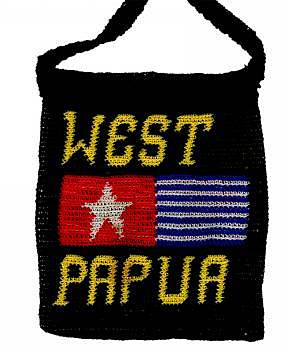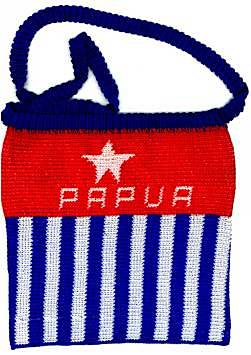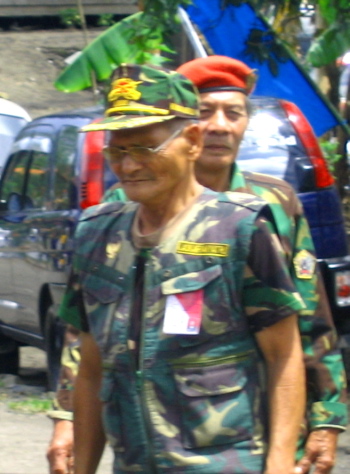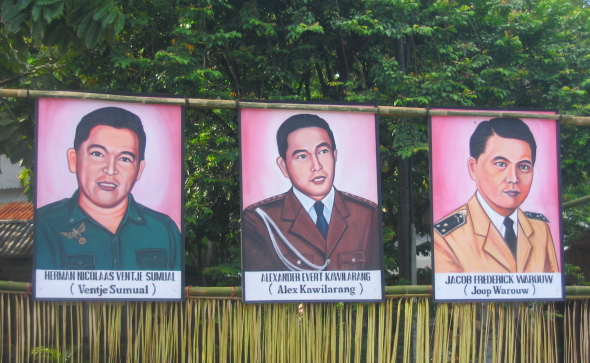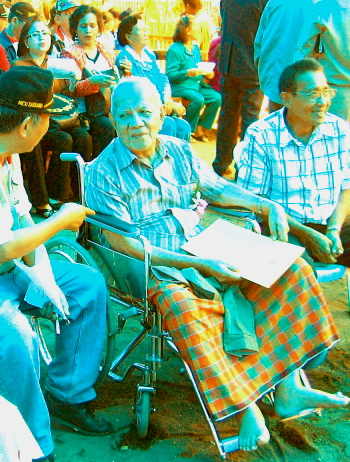From the highlands of Papua to exile in England, Benny Wenda is a leader of his people
Jennifer Robinson
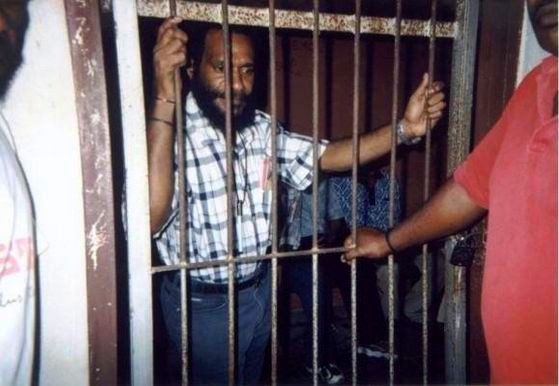 |
Benny was detained in Abepura prison during his trial in 2002 Jennifer Robinson |
As a young child in the 1970s, Benny Wenda’s world was his village in the remote highlands of West Papua. Life consisted of tending gardens with his mother among the Lani people who, he says, ‘lived at peace with nature in the mountains’. In 1977 that life changed dramatically.
That year, the military appeared in his village. Now, every morning on the way to their gardens, Benny and his mother and aunties would be stopped and checked by Indonesian soldiers. Often the soldiers would force the women to wash themselves in the river before brutally raping them in front of their children. Many young women, including three of Benny’s aunties, died in the jungle from the trauma and injuries inflicted during these attacks, which often involved genital mutilation. Every day Papuan women had to report to the military post to provide food from their gardens, and to clean and cook for the soldiers. Violence, racism and enforced subservience became part of daily routine.
‘I asked myself ‘why?’ Who are these people? And why do they do this to us? Why do they kill my people? Why do they rape my aunties?’
Later that year, and in response to military violence towards Papuans, 15,000 Lani people rebelled. In retaliation, Indonesian military aircraft bombed many Lani villages in the highlands, including Benny’s village. Benny remembers an attack where their huts and crops were burned and many of his family were killed or injured. Benny too suffered in the attack: his leg was badly injured and left untreated because his family was forced to flee into hiding in the jungle, leaving him with one leg significantly shorter than the other and an awkward limp. More than twenty years later the scars, the pain and the difficulty in walking remain.
Childhood in the jungle
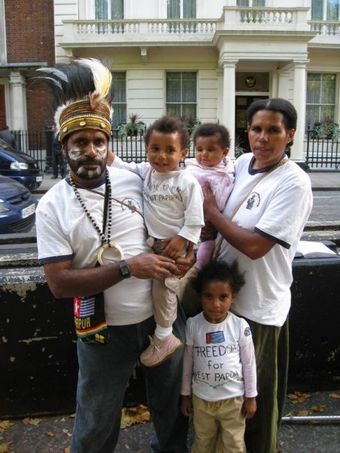 |
Benny and Maria Wenda with their young children regularly organise
and take part in protests at the Indonesian Embassy in London. Here
at a protest in 2008 Dominic Brown |
Between 1977 and 1983 Benny and his family, along with thousands of other highlanders, lived in hiding in the jungle. Life was hard. Food and shelter were scarce, and the weak struggled to survive the harsh conditions. Violence from the military remained a constant threat. In one particularly harrowing incident, soldiers happened across Benny’s family in the jungle. The soldiers ripped Benny’s two year old cousin from his aunty’s arms and threw her to the ground with so much force that the child’s back was broken. They then raped his aunty, forcing Benny to watch. His small cousin died two weeks after the attack; his aunty sometime later from her own injuries. Benny could not understand why the Indonesian military was doing this and, still, he had no knowledge of the context in which this violence took place.
Benny says he could not understand. ‘I asked myself ‘why?’ Who are these people? And why do they do this to us? Why do they kill my people? Why do they rape my aunties?’
After five years in the jungle, everyone else from his village had succumbed to the conditions and surrendered to the Indonesians. Only his family remained in the jungle. To surrender, Papuans had to present themselves to the local military post carrying an Indonesian flag, which signalled their loyalty to Indonesia and their willingness to live in the community under Indonesian rule. When Benny’s grandmother died, largely due to conditions in their jungle hideout, their family decided it was time to surrender for the sake of the children. Having already lost so many, Benny’s grandfather insisted that the children be taken back, telling his mother that Benny’s well-being was important ‘so that one day he will know what happened to us and why…and one day he will act’.
Becoming ‘Indonesian’?
After his family surrendered, Benny went to school. His education was entirely about Indonesia. He learned about Indonesia’s independence from the Dutch and celebrated it on the anniversary of 17 August 1945. He learned about buffalos instead of pigs and of rice paddies instead of the Papuan-style gardens that he had grown up working in with his family. He was told to eat rice instead of sweet potato, the staple for Papuans. Indonesian teachers and students alike called Benny and the other Papuan students ‘stupid’, ‘primitive’, and ‘dirty’ because they ate pork and their parents were ‘indecent’, with the men wearing nothing but the traditional koteka (penis gourd).
Benny still could not understand why Indonesians treated him this way. He constantly went to his mother with questions. ‘Why did I grow up in the jungle? Why am I different to the others? Why do they call me stupid?’ he would ask. His mother refused to answer his questions. ‘One day I will tell you the whole story’, was all she would say.
In senior high school Benny was one of only two Papuan students in the class. The others were children of Javanese and Sulawesi transmigrants. One day, the teacher directed him to sit next to a Javanese girl. He smiled and respectfully greeted her as he sat down. She turned, scowled, and spat on him. He wiped her spit from his face, feeling terrible. ‘Maybe I really do smell’, he thought. ‘I disgust her. I must not be clean enough. That must be why she doesn’t like me.’ Assuming the problem was his, and desperate to please this girl, Benny went to the shop after school to buy an extra bar of soap. He washed himself three times over. The following day, he walked confidently into the class and sat down, smiling and greeting the girl with respect. But this time she stood up, attracted the attention of the entire class, and spat on him again. The class laughed.
Finally, it dawned on Benny: this had nothing to do with his cleanliness. This was racism. Benny stood up, enraged: ‘You think that because I am black, because I am Papuan, that I am dirty!?! I have eyes, I have hands…I am human – just like you! We are both human and we both deserve to be treated the same. With respect.’
Finally, it dawned on Benny: this had nothing to do with his cleanliness. This was racism
Events such as these drove Benny to take on a leadership role in the Papuan community. His motivation sprang not from politics, but from the desire to assert and celebrate Papuan identity, and to encourage other Papuans to do the same. Benny went on to complete a degree in sociology and politics in Jayapura. While at university, he initiated discussion groups for Papuan students in Jayapura – of all ages and from all tribes from both the highlands and coastal regions – so they could come together and talk about what it was to be Papuan. Above all, Benny wanted to change the mindset of Papuan children, children who had been brought up being told they were primitive, dumb and dirty, to teach them that they should be proud of being Papuan.
Searching for the truth
But for Benny, questions remained. While he could speak of his own terrible experiences, he still understood very little of the broader conflict and context in which his personal suffering – and that of his village – had taken place. Frustrated with the lack of information he was provided in school, and his mother’s refusal to answer his questions, he sought out information about Papuan history. He searched the school library, the public library, the university library. But he found nothing. ‘Why do we only study Indonesian history? The history of Java, Sumatra and Bali? Where is the history of Papua?’ he asked himself, and others.
During the 1980s, and even into the early 1990s, there was very little written history or discussion about the circumstances of Papua’s incorporation into Indonesia or the events that followed. Eventually, through story-telling, Benny came to learn how the Dutch had retained control of the province after 1945 and promised independence. He found out about the declaration of Papuan sovereignty on 1 December 1961, about the West Papuan flag (the Bintang Kejora), the national anthem (Hai Tanahku Papua), the Indonesian invasion and the 1969 ‘Act of Free Choice’ when a small group of hand-picked Papuans were intimidated into voting for integration with Indonesia.
Finally he understood the root causes of why the Indonesians treated West Papuans as they did. Yet at that time, Benny recalls that no one was allowed even to use the word ‘Papua’ or ‘West Papua’, only ‘Irian Jaya’, let alone discuss publicly Papuan history, culture or identity. Books were censored. But knowing the historical origins of the oppression was enough. Of the decades of violence, discrimination and oppression, Benny needed no written record: he had first hand experience.
Demmak and the ‘Papuan Spring’
After the fall of Suharto, the relaxation of military control and the independence of East Timor in 1999, demonstrations and flag raisings occurred across Papua, with Papuans demanding their own referendum on independence. In the period between 1999 and 2000, known as the ‘Papuan Spring’, Jakarta held dialogue with Papuan leaders and the Presidium of the Papuan Council (PDP) was formed to represent the Papuan nationalist movement and to negotiate Papua’s future.
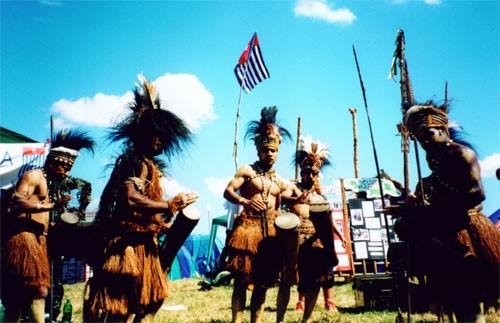 |
The Lani Singers perform with Mambesak, a dancing troupe of West Papuans in exile in the
Netherlands, at Glastonbury Festival, England Dancing Turtle Records |
It was during this period that Benny became leader of Demmak (Dewan Musyawarah Masyarakat Koteka), the Koteka Tribal Assembly. Demmak was established by tribal elders with the goal of working towards recognition and protection of the customs, values and beliefs of the tribal people of West Papua. It advocates independence from Indonesia, and rejects special autonomy or any other political compromise offered by the Indonesian government. As Secretary-General of Demmak, Benny represented the council of elders. The organisation supported PDP negotiations with Jakarta to the extent that they represented the aspiration of the Papuan people, which was independence from Indonesia.
But when Megawati became President in July 2001 policy on Papua changed. A compromised version of special autonomy was the only politically viable option. The Papuan Spring was over and the military crackdown on known ‘separatists’ began. In November 2001, Theys Eluay, leader of the PDP, was assassinated by soldiers. But Benny stood firm to Demmak’s aim: full independence from Indonesia.
Political persecution….and escape
The political freedom to express aspirations for independence quickly evaporated. Once again, it became dangerous to support independence. Secret documents later discovered by human rights organisations named specific organisations and individuals that had to be ‘dealt with’, including the PDP and Demmak. On 6 June 2002 Benny was arrested and detained in Jayapura. His home was ransacked without a warrant and the police refused to inform him of the charges brought against him. He was tortured by police and held in solitary confinement for several months. Sometime later he was charged with inciting an attack on a police station and burning two shops in the small township of Abepura on 7 December 2000, which left a policeman and a security guard dead.
For his political views, Benny was being charged with a crime he did not commit
These charges related to the infamous, ‘Abepura incident’, in which violent acts of retaliation by Indonesian police were committed against the Papuan community, resulting in the arrest of over 100 people, police violence and torture in detention and the death of at least three students in the days following. Two police officers were prosecuted for crimes against humanity before the Human Rights Court in 2005 for these events, but were acquitted. Benny faced criminal prosecution for the initial attack on the police station, for inciting acts of violence and arson and was likely to receive up to 25 years in prison. Yet he was not even in the country at the time the alleged planning and execution of the attacks took place. For his political views, Benny was being charged with a crime he did not commit.
His trial commenced on 24 September 2002 and lasted for several weeks. Armed policemen surrounded the courtroom each day, as Benny’s many supporters turned out in a show of support for their leader. Facing the judges he was stoic and resolute in proclaiming his innocence. To his supporters he was warm and encouraging, smiling and shaking hands with those who lined his path between the courtroom and police vehicle.
The trial was flawed from the outset. The prosecutor and judge requested bribes from Benny’s defence team, but were refused. The persons named as key prosecution witnesses could not be identified and failed to attend court to be cross examined on their statements. Defence counsel for Benny insisted that the witness statements be thrown out on the basis they were fabricated by police to implicate Benny in the attack. But the judge, who appeared biased and hostile to Benny throughout the proceedings, accepted the evidence. It was obvious that Benny would not receive a fair trial.
Rumours were rife that military intelligence would kill him in detention before the judge rendered a decision
Meanwhile, inside the prison, Benny was physically attacked several times by prison guards. On the advice of his lawyers, he did not eat the food provided in prison because of the risk of poisoning. Because the evidence against him in court was so weak, rumours were rife that military intelligence would kill him in detention before the judge rendered a decision.
The court was adjourned pending a decision. Conviction – or death – seemed certain. Then, in miraculous circumstances that he does not want to explain for fear of endangering the persons who helped him, Benny escaped from Abepura prison on 27 October 2002. The Indonesian police allegedly issued a shoot to kill order. But aided by West Papua independence activists, Benny was smuggled across the border to PNG and later assisted by a European NGO group to travel to the UK where he was granted political asylum. In 2003, Benny and his wife Maria were reunited in England, where they now live with their five children.
The campaign goes international
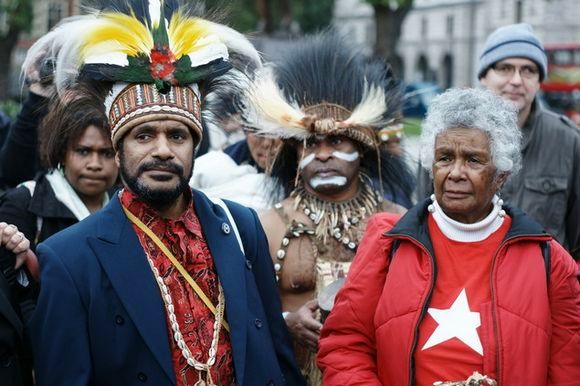 |
Benny Wenda attends UK parliament for the launch of International Parliamentarians for West Papua, which was
also attended by Papuan families living in exile in the Netherlands and Sweden Benny Wenda |
Soon after being granted refugee status in the United Kingdom, Benny began campaigning for the self-determination of his people on a wide range of fronts, utilising politics and music. He set up the Free West Papua Campaign, which works to spread awareness of human rights abuse in West Papua and seeks self-determination for the people of Papua. He has met with prominent politicians and presented petitions to 10 Downing Street. He travels constantly throughout the UK and Europe raising awareness about the plight of his people.
Benny and Maria have also used traditional music to raise awareness about their struggle. As The Lani Singers (http://www.thelanisingers.com/), they have performed live on BBC Radio, as well as at Musicport Festival, Glastonbury Festival and the Thames Festival in London. In 2008 they released their debut album, Ninalik Ndawi (Freedom Song), which has been reviewed in national newspapers and music magazines.
More recently, on 15 October 2008, with British MP Andrew Smith and peer Lord Harries, he launched International Parliamentarians for West Papua (IPWP) at the House of Commons in London. IPWP is actively developing support from parliamentarians around the world, with the aim of creating support at the United Nations to provide Papuans the opportunity for a referendum for self-determination.
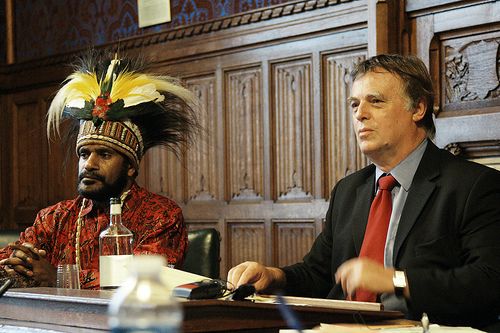 |
Benny Wenda and Andrew Smith MP, member for Oxford, at the launch of the International
Parliamentarians for West Papua at the Houses of Parliament, London, 15 October 2008 Benny Wenda |
Then, in April 2009, Benny launched International Lawyers for West Papua (ILWP) in Guyana, South America. ILWP seeks to develop a network within the international legal community which recognises the legal basis for West Papuan self-determination and raises awareness about human rights abuse in West Papua. In Papua, and throughout Indonesia, thousands of Papuans took to the streets to support the IPWP launch. In Jayapura, demonstrations were met with violence and arrests. Two activists were killed, and many others were arrested and tortured. Several activists are facing criminal prosecution for subversion for engaging in peaceful demonstrations in support of Benny’s campaign. Indonesian media sources reported that, following the IPWP launch, the Chief of Police in Papua and Interpol requested that the UK arrest Benny on the grounds that he is a criminal fugitive since escaping from prison in 2002, requesting further that Benny be extradited to Indonesia to face the outstanding charges against him. One report even stated that an Interpol red notice – usually reserved for international terrorists and drug cartel leaders – had been issued for Benny.
‘While my people continue to suffer and continue to die, nothing will stop my campaign.’
While the UK and other parties to the European Convention on Human Rights are prevented from extraditing Benny to Indonesia (because of the real risk he would suffer torture or inhumane or degrading treatment once returned), Interpol arrest warrants are difficult to have removed and those subject to red notices are ill-advised to travel abroad.
Yet Benny remains undeterred. He holds a deep and enduring belief that justice will eventually prevail, and he sees his remarkable escape from persecution in Indonesia as testament to that fact. He recognises that other freedom fighters, like Arnold Ap, Theys Eluay and Bill Tabuni, have not been so lucky. But this only strengthens his resolve. ‘While my people continue to suffer and continue to die, nothing will stop my campaign’, he says. For him, there is only one way to stop the killing, and ensure that Papuans enjoy the same freedoms that people elsewhere in the world already enjoy: Papua must be independent. And to that end he continues his campaign.
Jennifer Robinson (jkr.robinson@gmail.com) is an Australian lawyer and Rhodes Scholar at Balliol College, University of Oxford. She worked on Benny Wenda’s trial in Abepura in 2002 and his subsequent political asylum application in the UK.
